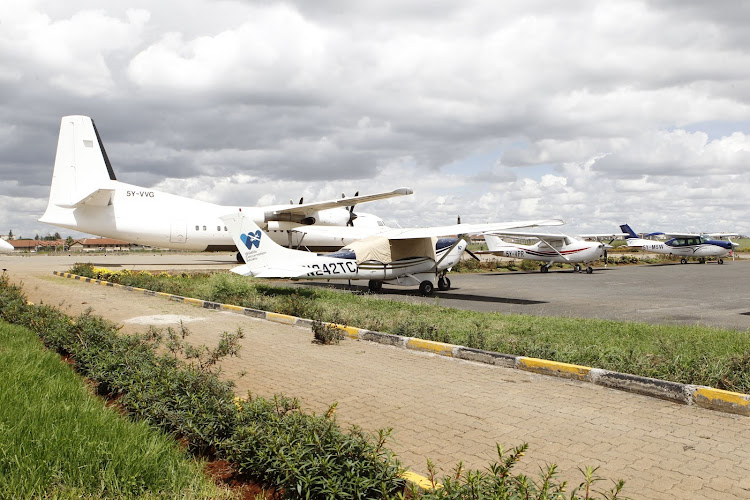Planes at an aviation hanger at the Wilson Airport. Kenya’s aviation sector is gradually rising from the damaging blow inflicted by the Covid-19 pandemic in 2020, Kenya Civil Aviation Authority (KCAA) has said.
KCAA Director General Capt. Gilbert Kibe has revealed that the average daily Aircraft movement is currently about 550 from 1,045 before the pandemic.
Current daily international aircraft movement is at 110 while domestic traffic is 440.
With the setting in of the Coronavirus pandemic, Kenya and the global aviation sector was largely affected, with passenger traffic in July 2020 recording a decline of 94 per cent in comparison to the same period in 2019 due to the pandemic.
According to the data released by KCAA, aircraft traffic movements was lowest in July 2020, standing at 9,185, which decreased by 68 per cent below the levels of July 2019 (28,825).
"Macroeconomic data on recent estimates of demand shocks show that traffic forecast will return to 2019 levels in 2024 at a low growth rate of 3.6 per cent compared to 4.2 per cent before Covid-19,” Kibe said.
This is based on International Civil Aviation Organisation (ICAO) Global forecast.
KCAA added that "international lags are envisaged up to 2023 based on income reduction for leisure travel and countries restrictions to travel."
However, on the local front, domestic traffic growth is expected to resume to normal in 2022 based on the level of vaccination in the country.
This estimate assumes that there will be no unforeseen challenges that may be posed by new variants of the coronavirus, such as new vicious strains of the Delta variant.
In the last year, several measures were instituted to support the aviation sector absorb the pandemic shocks.For instance, KCAA offered exemptions and dispensations where full compliance with applicable aviation requirements was not possible, of course without compromising aviation safety and security.From March 31, 2020, expiry periods for Air Operation Certificates (AOCs) were extended for a period of six months, and thereafter, extensions were given on a case-by-case basis until it became possible to resume on-site Inspections.Similarly, Designate Check Pilots (DCPs) renewals, Flight Simulator Training Device (FSTD)renewals, and Various Regulatory Training and Checks recurrent approvals were extended for periods determined on a case-by-case basis.This would be informed by the submitted Risk Analysis and Alternative means of compliance proposed by the Operator.Another measure taken was to waive Fees and Charges for services rendered for the period of exemption/dispensation.According to Capt Kibe, since the resumption of […]
